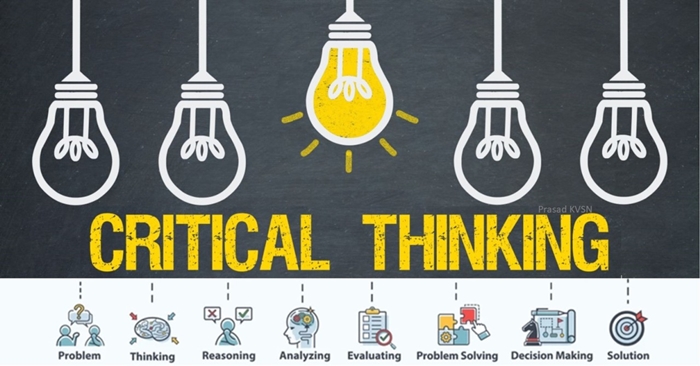In this article, we discussed the importance of critical thinking skills in the digital age, concept of critical thinking, how it influences decision making, we also talked about utilizing it in dada analysis.
In today’s rapidly evolving digital landscape, the ability to think critically has never been more crucial. The inundation of information from various digital sources presents unique challenges that demand advanced cognitive skills in data analysis, logic, and decision-making.
Definition
Critical thinking involves more than just thinking clearly or possessing intelligence. It is a disciplined process of actively analyzing, producing, and estimating information gathered from observation, reflection, reasoning, or communication.
Importance of critical thinking in the digital age
In today’s digital age, critical thinking has become increasingly significant as individuals are bombed with vast amounts of information from various sources, many of which may be unreliable or biased. The ability to effectively sift through this ocean of data is essential. Critical thinking skills enable individuals to:
– Evaluate the credibility of information sources: Not all information available online is accurate or trustworthy. Critical thinkers can assess the source of the information, understand the context, and judge its reliability and validity.
– Overcome misinformation and biases: The internet is rife with misinformation and inherent biases. Practicing critical thinking helps individuals recognize these biases and avoid being influenced by them, ensuring a more objective approach to information.
– Make informed decisions: Whether it’s personal decisions or professional tasks, critical thinking aids in considering all aspects and potential consequences of a decision, leading to more informed and rational outcomes.
– Enhance creativity: By questioning existing ideas and exploring alternative solutions, critical thinking fosters innovation and creativity, which are vital in navigating the complexities of the digital world.
How critical thinking influences decision making
The influence of critical thinking on decision making manifests through clearer, more logical thinking paths, and a reduction in bias. Here’s how it unfolds:
Clarity and focus: Critical thinking helps in clearing the fog of information overload that characterizes the digital era. By focusing on the quality of data and the authenticity of information sources, it aids individuals in effectively focusing on what matters most.
Risk assessment: Having the ability to think critically equips decision-makers with the tools to foresee potential risks and outcomes. This anticipatory approach towards problem-solving and decision making minimizes potential damage and improves overall organizational efficiency.
Innovation: Critical thinking encourages thinking outside the box, which is crucial in today’s technology-driven marketplace. By engaging this skill, individuals and organizations can devise creative solutions, driving innovation and fostering competitive advantage.
Employing critical thinking to navigate decision-making challenges not only leads to better outcomes but also bolsters the robustness of decisions in the face of scrutiny and opposition.
Utilizing Critical Thinking Skills in Data Analysis
When data analysts apply critical thinking, they engage in several key practices:
Questioning assumptions: Critical thinkers scrutinize the foundations upon which data are built. This might involve considering the sources of data, the methods used to gather it, and the biases that could influence it.
Evaluating evidence: Not all data is created equal. Critical thinkers evaluate the reliability and relevance of data before drawing conclusions. They look for patterns and anomalies within the data that may indicate more complex issues.
Making informed decisions: By integrating logic and reasoning, critical thinkers use data to make decisions that are not only based on the evidence available but also considerate of potential consequences and alternative perspectives.
These critical thinking processes ensure that data analysis is a robust and thorough exercise, leading to actionable insights and smarter decision-making in the digital age. The deliberate application of these skills mitigates the risk of errors and enhances the potential for innovations derived from data-informed strategies. This reflects the essential role that critical thinking plays in navigating and exploiting the vast amounts of data generated in the digital era.
Conclusion
In the landscape of the digital age, critical thinking remains an essential skill, differentiating impactful decision-makers from passive data consumers. The ability to scrutinize information, deduce logical conclusions, and apply solutions uniquely positions individuals for success amidst a plethora of digital data and ubiquitous misinformation. Empowered by critical thinking, professionals and ordinary individuals alike can navigate the complexities of modern challenges more effectively, leading to better outcomes in personal and professional realms. Ultimately, fostering critical thinking skills not only enhances individual capabilities but also contributes to a more informed, discerning, and innovative society. To thrive in the digital era, enhancing our critical thinking prowess is not merely advantageous; it is imperative

